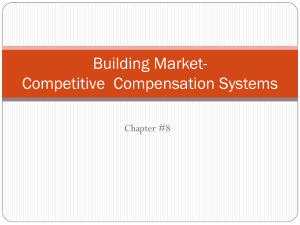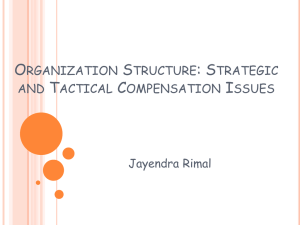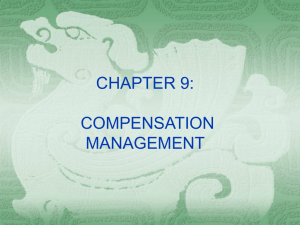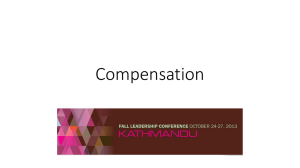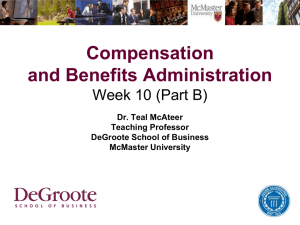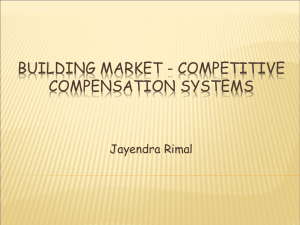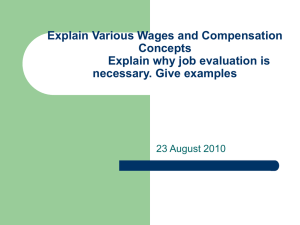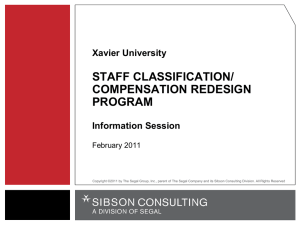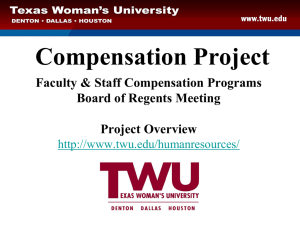Executive compensation
advertisement
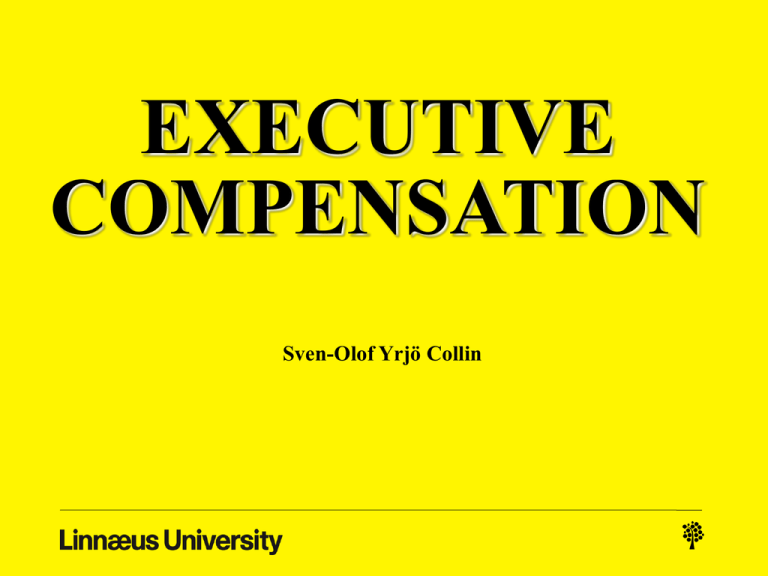
EXECUTIVE COMPENSATION Sven-Olof Yrjö Collin Me: Sven-Olof Yrjö Collin - Professor in Business Administration with emphasis on Corporate Governance and Accounting - Teach in corporate governance, accounting, management control, corporate finance, strategy, scientific method and supervise on all levels. - Research in corporate governance, for example riding schools, municipal corporations, family firms, but also executive compensation, accounting choice and auditing, duty. E-mail: sven.olof.collin@lnu.se Homepage: www.svencollin.se AIM OF LECTURE TO PRESENT EXECUTIVE COMPENASTION - AS RELEVANT AS POSSIBLE, i.e., AS AN HUNGARIAN SOUP AND THEN PRESENT - ONE ACCOUNTING THEORY VERSION, i.e., THE SIMPLE WATER SOUP BY POSITIVE ACCOUNTING THEORY THE COMPENSATION PUZZLE 40% Size of the firm Executive Pay Performance of the firm 5% 5 - 40 IN THE PRINCIPAL - AGENT CONFLICT? Size: Goal of managers AGENT 40% Size of the firm Executive Pay Performance of the firm 5% PRINCIPAL Profit: Goal of shareholders INSTITUTIONAL DIFFERENCES EXECUTIVE COMPENSATION € US, UK Germany Sweden Japan low OWNERSHIP STHRENGT high high TENDENCY TO USE OPTION SCHEMES low PRINCIPAL - AGENT RELATIONSHIP AGENCY RISK Competence Behaviour PRINCIPAL’S OBSERVATION Situation Situation Performance SEPARATING THE PROCESS OF COMPENSATION Mechanism of compensation Criteria for compensation Consequence WHO TO COMPENSATE Individual Group Figure head Individual ‘unfair’ Collaboration Mutual Monitoring ‘back stabbing MECHANISM OF COMPENSATION Objectivity Predictability Precision - Contract - Monitoring Transparency Risk Fairness CRITERIA FOR COMPENSATION • Performance • Behaviour • Individual characteristics • Labour market price • Position • Peer comparison PERFORMANCE MARKET MEASUREMENTS ACCOUNTING MEASUREMENTS SUBJECTIVE MEASUREMENTS •Noise •Influence •Informational •Motivational - Goal! - Strategy etc. STRATEGY Strategy Market dominance Structure Performance criteria: Sales growth CEO DISCRETION INFLUENCING PAY Task programmability Uncertainty CEO Discretion Compensation WHEN PAY - PERFORMANCE? uncertainty BEHAVIOUR CRITERIA Actions performed by the agent • subjective • costly time evaluators competence INDIVIDUAL CHARACTERISTICS •EDUCATION •COMPETENCE •NETWORK Consultants? Bidding-up hypothesis Reservation wage demand LABOUR MARKET Upper bound Price = Wage supply POSITION COMPENSATION • Figure head (Tournament theory) • Social recognition • Hierarchical level - responsibility - higher pay on next level • Information-processing requirements PEER COMPARISON REFERENCE POINT • Peers • Significant others WHO DECIDES ABOUT COMPENSATION? • The Board • The Chairman of the Board • The Dominant Owner • The Remuneration Committee - consultants... RELATIONAL CONTRACT • Exchange create externality • Experience => mutual expectations • No time horizon => trust Tenure => No correlation Pay & Performance Tenure => Less explicit control SOCIETY INFLUENCING COMPENSATION • Media • Social groups • Ideology ...more market-dependent decision makers, more fashionable compensation package KAUSALITY? DECIDE ABOUT COMPENSATION IN ORDER TO - ATTRACT AN INDIVIDUAL TO BECOME A CEO (recruitment) - MOTIVATE AN INDIVIUDAL TO PROPER PERFORMANCE (incentive) - ATTRACT INVESTORS TO THE SHARE (client effect, i.e., legitimation) CONSEQUENCE Base pay Variable pay Employment Prospects through reputation Intrinsic rewards ALIGNING COMPENSATION Environment Organisation Strategy Individual WHAT IS RISK? Return variance: Risk averse (Financial economics) Probability of loss: Loss averse (Behavioural finance) Expected value Bonus today or options for tomorrow EMPLOYMENT CONSEQUENCES Downward risk: unemployment Upward risk: Promotion Value of reputation REPUTATION - WAGE age INTRINSIC REWARDS • Job satisfaction • Prospects of development • Responsibility • Power • Good cause • Nice atmosphere at the job • Fun EXECUTIVE COMPENSATION IN ACCOUNTING THEORY From an spicy Hungarian soup to a simple soup of water (i.e., markets) containg two ingredients, shareholders and managers, and their risk attitudes and endless needs of profit. The strength of simplicity, i.e., abstraction, The weakness of empirical insignificance and practical irrelevance POSITIVE ACCOUNTING THEORY “…the only accounting theory that will provide a set of predictions that are consistent with observed phenomena is one based on self-interest” (Watts & Zimmerman, 1979:300). ECONOMIC CONSEQUENCES ACCOUNTING POLICY CHOICE, LACKING DIRECT CASH FLOW INFLUENCE, CAN INFLUENCE THE VALUE OF THE FIRM BECAUSE - INEFFICIENT CAPITAL MARKET - INDIRECT WEALTH EFFECTS - FOR MANAGEMENT - FOR THE FIRM - FOR INVESTORS - FOR DEBT HOLDERS - FOR SOCIETY, -I.E. MOST STAKE HOLDERS SHIRKING MANAGERS MANAGERS WITH THEIR OWN GOALS, … SO WHAT? MONITORING IS COSTLY - DIVISION OF LABOUR THROUGH SEPARATION OF OWNERSHIP AND CONTROL COMPETENCE TO MONITOR: INFORMATION – THEORY (EXPERIENCE) TO MANAGE THE MANAGER One mechanisms is executive compensation ESSENCE OF EXECUTIVE COMPENSATION FOR POSITIVE ACCOUNTING THEORY RISK SHARING INCENTIVE FOR SHAREHOLDER GOAL ATTAINMENT AND CONGRUENCE Not fairness, intrinsic rewards, employment etc PAT PREDICTION I: THE BONUS HYPOTHESIS MANAGERS WITH BONUS WILL CHOOSE ACCOUNTING PROCEDURES THAT SHIFT REPORTED EARNINGS FROM FUTURE TO CURRENT PERIOD PAT PREDICTION II: THE DEBT/EQUITY HYPOTHESIS MANAGERS IN FIRMS WITH HIGH DEBT/EQUITY (I.E., LOW SOLIDITY) WILL CHOOSE ACCOUNTING PROCEDURES THAT SHIFT REPORTED EARNINGS FROM FUTURE TO CURRENT PERIOD HIGH FINANCIAL RISK IS A TREATH TO MANAGERS AUTONOMY IF THE FIRM HAS CONSTRAINTS ON DEBT LEVELS PAT PREDICTION III: THE SIZE HYPOTHESIS THE LARGER THE FIRM, THE STRONGER INCENTIVE THE MANAGER HAVE TO DEFER REPORTED EARNINGS FROM CURRENT TO FUTURE PERIODS Large firms have higher political costs, media attention, union attention and so on, that stimulate wage increase, tax changes, more charity and so on.

